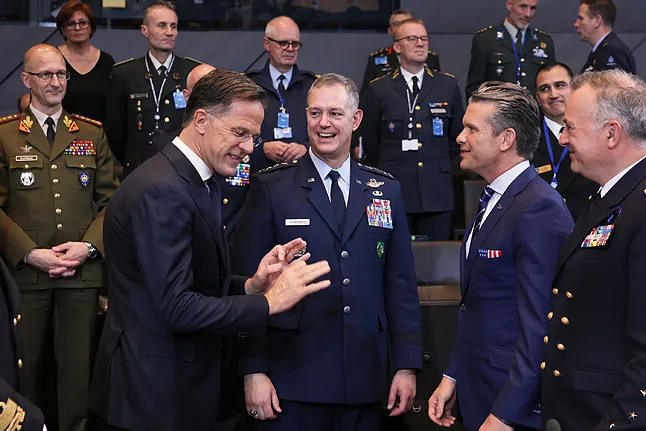"Firepower. That's what's coming. It's what we expect to come from NATO." U.S. Secretary of Defense Pete Hegseth made it very clear that this is what the Trump Administration wants from the North Atlantic Treaty Organization. That the capabilities commitments reached at the Hague summit translate into more weapons and that, furthermore, more allies join the PURL program, which involves European countries buying weapons from the U.S. to send to Ukraine.
"The initiative through which European countries purchase American weapons that are transferred to NATO for the fight in Ukraine, in order to bring peace to that conflict," explained the Pentagon chief during the meeting of Defense Ministers of the Alliance held in Brussels. "Our expectation is that more countries will donate even more, buy even more, to provide Ukraine with the necessary means to bring that conflict to a peaceful conclusion," he emphasized.
As explained by the Trump Administration official, Germany, Canada, the Netherlands, Sweden, Denmark, and Norway have already participated in purchasing weapons from the United States worth $2 billion. Just over 1.7 billion euros. He added that slightly more than half of the 32 NATO allies plan to participate in the initiative.
Finland, for example, has announced that it will join the plan. "We know that these weapons are crucial for Ukraine. All European countries should be able to participate in this program," said the country's Defense Minister Antti Häkkänen, as reported by Efe. The Spanish Defense Minister, Margarita Robles, did not rule out Spain doing the same. Belgium, Estonia, Iceland, Latvia, Lithuania, and Luxembourg are also considering joining.
And German Defense Minister Boris Pistorius announced that his country will increase its purchases of American weapons by $500 million (429 million euros). "Germany's package addresses a number of urgent needs in Ukraine. It provides air defense systems, Patriot missile interceptors, radar systems, precision-guided artillery, rockets, and ammunition," he stated.
Pete Hegseth also stated that the war in Ukraine began before Trump took office, but "will end during his term." "If there's one thing we've learned under President Trump, it's the active application of the principle of peace through strength. Peace is achieved when you are strong, not when you use strong words or wag your finger. It is achieved when you have strong and real capabilities that adversaries respect," he emphasized.
And if that doesn't work, if all the mentioned measures are not enough, the U.S. representative hinted that his country is prepared to impose sanctions on Vladimir Putin. "If we must take this step, the Department of Defense is prepared to do our part in ways that only the United States can," he underscored.
From Ukraine's side, Defense Minister Denys Shmyhal stated that his country will need $120 billion next year, about 103 billion euros. "Ukraine will cover half, 60 billion, with our national resources. We are asking partners to join us in covering the other half," he indicated. Here, in addition to NATO and the PURL program, fits the European Commission's desire to use the frozen assets that Russia holds in Euroclear.
Next week, also in Brussels and during the meeting of presidents and prime ministers, this will be one of the main issues: how to address the use of 185,000 million in Russian liquidity without it appearing as confiscation. Although in reality, it may be, or at least, closely resemble it.
